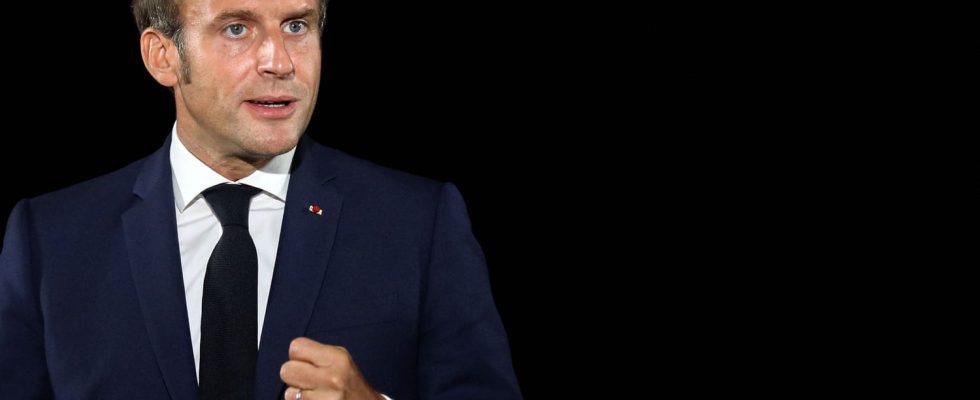The President of the Republic said he was open to “the entry of Corsica into the Constitution”, but rejected the co-officiality of the Corsican language and the creation of a resident status.
Emmanuel Macron is in Corsica from Wednesday September 27 to Friday September 29, 2023. This visit, which coincides with the 80th anniversary of the liberation of the island, is an opportunity for the President of the Republic to speak on the status of the Corsica, a subject which crystallizes tensions between the State and island nationalists.
The Corsican autonomists and separatists were firmly waiting for Emmanuel Macron. The President of the Republic announced, before theAssembly of Corsica, concrete progress on the autonomy project designed by the nationalists. “Corsica today needs more freedom,” the head of state first said.
Emmanuel Macron in favor of “autonomy for Corsica”
“Let us have the audacity to build autonomy for Corsica in the Republic. This autonomy must be the means of building the future together,” he then declared. The Head of State revealed the outlines of this project: “a draft organic law” must be prepared in the next six months before the constitutional revision is included in the status of Corsica. More concretely, the Head of State wants the Constitution to include a new article devoted to this subject, therefore recognizing the “singularity” of Corsica. But this measure could very well be only symbolic.
Furthermore, the revision of the French Constitution is a complex process which requires the agreement of several actors depending on the Constitutional Council. First of all, the President of the Republic and the government must agree on the draft revision necessary for the introduction of a new article. Then, both houses of Parliament, the National Assembly and the Senate, must also approve the draft revision. At present, it seems unlikely to see the Senate give its agreement for a new status for Corsica.
Emmanuel Macron wanted to emphasize the “historic” nature of his gesture: “Corsica must be included in the Constitution: it is your wish, I share it and I make it mine.” He therefore said he was “in favor of the specificities of the Corsican island community being recognized in the Constitution within its own article”. The president hoped that “the Corsican language could be better taught” and “placed at the heart of Corsican life”, that it would have “more place in public life”.
A long cycle before Corsican autonomy
Since the death in prison of Yvan Colonna on July 21, 2022, a cycle of discussions has been initiated by the State to reflect on the institutional framework of Corsica. These discussions were led by the Minister of the Interior, Gérald Darmanin, the prefect of Corsica, Amaury de Saint-Quentin, and the president of the executive council of Corsica, Gilles Simeoni. The latter, during the executive council of Corsica on September 27, 2023, confided: “We expect concrete progress from Emmanuel Macron on the autonomy project. We are ready to negotiate in good faith, but we are not prepared to make any concessions on our fundamentals.”
The government does not want independence for Corsica
Disagreements remain, particularly on the question of taxation and the possibility of legislative autonomy for Corsica. Jean-Martin Mondoloni, the co-president of the Un Soffiu Novu group, made progress with the World that the debate on autonomy “is only a political media bubble” which does not interest the Corsicans. The chances of success of negotiations between the State and Corsican nationalists are therefore difficult to assess.
The autonomists and separatists positioned themselves during the vote in the Corsican Assembly of a deliberation submitted to a vote by the group of President Simeoni, Fà Populu Inseme, which states “its desire that Corsica be endowed with a status of autonomy within the framework of the French Republic”, and which stipulates “recognition of the existence of the Corsican people and their rights; a status of co-officiality of the Corsican language; a status of resident”. On these two points, the government has effectively closed the door.
Emmanuel Macron’s promises to the Corsicans
At the start of 2023, Emmanuel Macron went to Corsica to relaunch negotiations on the institutional future of the island. He had assured Corsican elected officials that he was ready for significant developments, but that he was within two limits: the maintenance of Corsica in the Republic and the refusal to create two categories of citizens.
The head of state declared that he had “no taboo” or “predetermined solution”. He said he was ready to include possible developments in his draft reform of the Constitution, which was to be presented “after the summer”. However, the head of state’s two “red lines” could limit progress. Maintaining Corsica “in the Republic” could be interpreted as a refusal to grant too much autonomy to the island. Understand: no real transfer of legislative power. The refusal to create two categories of citizens could also be interpreted as a refusal to grant a special status to Corsican citizens.
